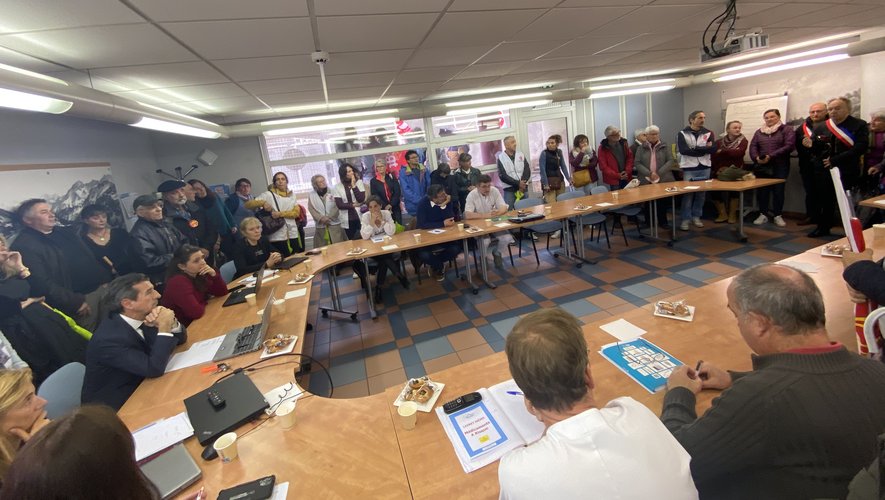The staff of the Astugue hospital gathered Monday morning in front of the Bagnères hospital center to express their concern at the closure of 22 beds.
A little over fifty people, unions, staff and users, not to mention the association for the defense of Bagnères-de-Bigorre hospital, gathered in a light rain after the announcement of the closure of 22 beds due to a recurring shortage of doctors. Inside, a meeting of the hospital management with the ARS and the CME, the Medical Establishment Commission, was held at the same time, an opportunity for the representatives of Montaigu to invite themselves around from the table, as Christelle Brua and Sabine Pastor, CGT union secretaries at the Astugue hospital, confided, but also Wilfried Zapparoli, departmental secretary of the CGT Santé: “We asked for an appointment at the ARS from el beginning of March and they still haven’t seen us because they don’t have a time slot on their agenda. So, as there is this meeting today, we invite ourselves. We have 22 beds which are closing and, since the beginning of April, we have been missing a doctor”.
Indeed, recruitment is complicated and in Astugue, currently, the establishment therefore works with a doctor, another retired but who works part-time as well as a “seniorized” doctor, that is to say say, that it must be supervised by a qualified doctor, like an apprenticeship. Concerns that therefore led them to Bagnères, or there too, the subject of the closure of emergencies during the night is also on everyone’s lips: “Today, we will let them settle in and afterwards, we will knock on the door so that they receive us”.
“We are not abandoning any establishment”
Outside, Astugue staff, trade unionists but also elected officials such as the mayors of Astugues, Mérilheu and Gerde as well as the deputy, Sylvie Ferrer: “The ARS manages the shortage created for 25 years, all of this, these are political things, we also see that on drugs”. The representatives were received by Christophe Bourriat, director of the hospital, Manon Mordelet, director of ARS 65 and finally, it was almost the whole procession which crowded together to also attend the exchanges.
The opportunity to put the finger on several subjects including the sustainability of the hospital of the thermal city without omitting the question which had brought the people present on the spot, the elimination of these 22 beds, a “national problem” for the director of the hospital: “We are not abandoning any establishment, the management has never taken this orientation. We are dependent on a situation of understaffing of medical and paramedical personnel, as at the national level”.
“Having the possibility of maintaining a medical activity”
The attractiveness of the Astuge hospital is also in question according to Christophe Bourriat: “In Bagnères, after the retirement of doctors, others arrived and the situation recovered. I am less optimistic for Astugue. We have a much smaller establishment and the departure of a doctor can be seen immediately, not to mention that the on-call duty returns one week out of three and that too is quite repulsive. another doctor to double the guard and that’s why we organized this meeting with the ARS, to reflect together. We must see how we must engage before having a medical rupture on Astugue and thus, be able to have the possibility to maintain medical activity on the site. The closure of 22 beds out of the 88, did I have a choice? No. I did not have the staff to operate the establishment, it was suicidal and the decision that we made was to reduce the airfoil in terms of the number of beds because we want to keep the Astugues hospital open”.
The Bagnères emergency problem was also put on the table: “How are we going to do, we users?” asked a resident. The director recalled that the emergencies are indeed closed at night in summer, due to a lack of staff, but clarified: “We have always had beds closed in summer and users have always been treated. There is vacant nursing positions, it’s a holiday period and it’s not an abnormal situation compared to other years, summer closures have existed for years”. The meeting continued beyond noon and other thorny subjects were discussed such as that of the common hospital, but the parties agreed to meet for working groups and try to find a solution to this shortage of doctors.

